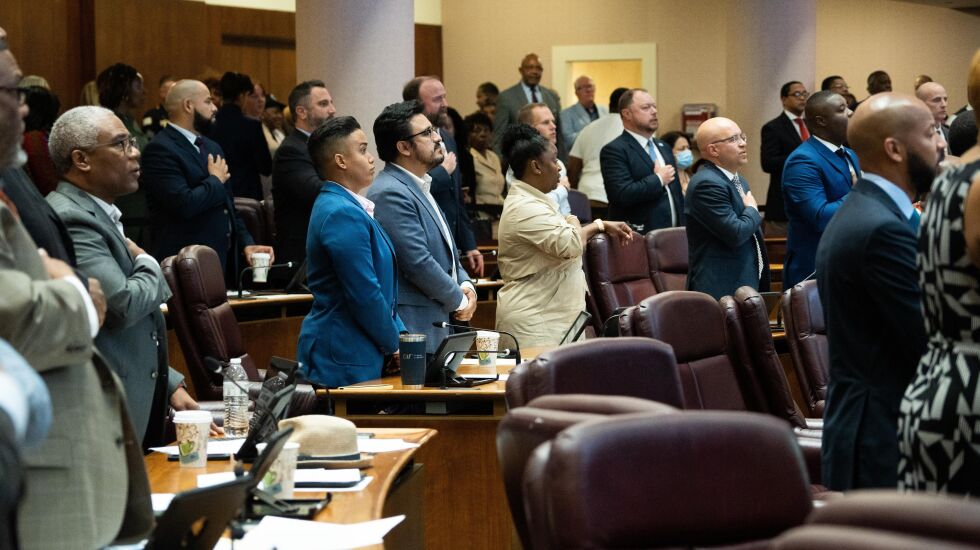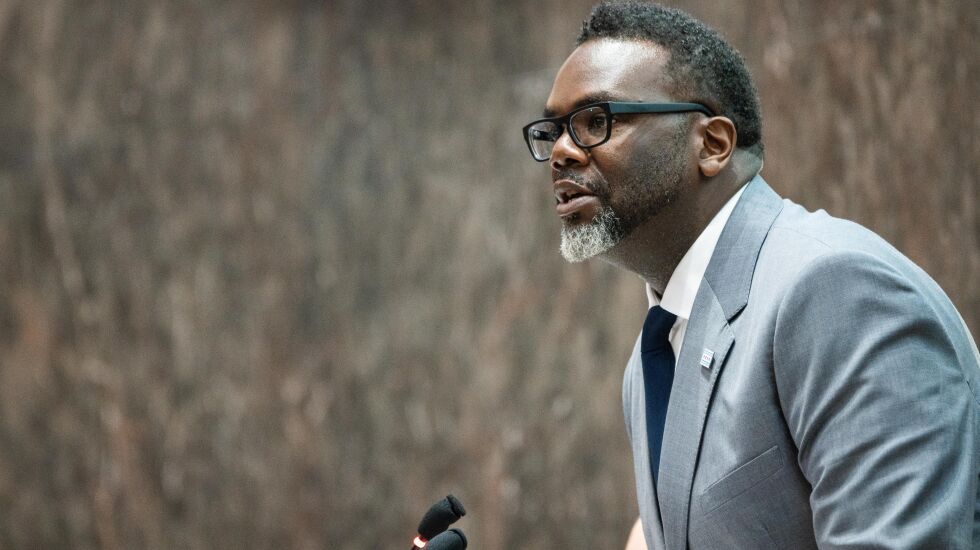
A divided City Council agreed Wednesday to slap a $51 million Band-Aid on Chicago’s burgeoning migrant crisis after a cathartic and racially charged debate that reduced one member to tears.
The 34-13 vote will provide enough funding to carry Chicago only through June 30.
After that, even tougher choices will have to be made.
The raucous and tension-filled meeting saw public speakers on both sides of the migrant crisis shouting each other down, prompting appeals for decorum from Mayor Brandon Johnson.
Ald. Jeanette Taylor (20th), whose ward includes a respite center at shuttered Wadsworth Elementary School, was crying as she shouted from her seat about the racial tensions triggered by the emergency request to earmark $51 million for the migrant crisis while the needs of African Americans continue to be ignored.
“Don’t let these tears fool you. When I have these tears, it’s usually because I’m mad as hell and I want to fight,” Taylor said after apologizing for sitting because “my knees are on fire.”
“I’m so tired of, when it’s a crisis for everybody else, we go, ‘We gotta do something.’ But, when we’re having this violence in the Black community, nothing gets said or nothing gets done. ... It ain’t our responsibility to take care of everybody else, and we’re tired because we do just that. When we fought for civil rights — when we fought just to drink out of a damn fountain — it was just us,” said Taylor.
Noting that African Americans came to this country on slave ships, Taylor said, “This wasn’t my choice. I would never choose to live in a space that hurt me every day. ... I know it’s right to help other people because, as Black people, that’s what we do. But when the hell are you gonna help us?”
After Taylor spoke, her colleagues gave her a standing ovation. But after she voted for the fund transfer, she faced shouts of “traitor!” and “sellout!” from the gallery, prompting Johnson to weigh in.
“I would respectfully ask that this chamber respect the order and decorum of this body of government,” the mayor said. “The position has been stated. Your position in opposition has been heard.”

Ald. David Moore (17th) told colleagues “the soul of Chicago is somewhat on trial today,” invoking the theme of Johnson’s inaugural address.
“Fifteen percent of my residents are Latinos. It hurts my heart as I hear people trying to make this a Black and Brown issue. Some of my Latino residents are saying the same things. … I hear them all saying, ‘What about us?’ ” Moore said.
“I get calls from seniors who have paid their taxes for 60 or 70 years. Their porches are falling down. Their roofs are collapsing. Yet they have to go through a lottery to stay in their homes. Some of ’em end up homeless. They go to a field house that’s 100 years old. It’s falling apart. They say, ‘Y’all get us no money for that.’”
After visiting a police station and seeing Hispanic babies, some of whom “look just like me,” Moore said, his “heart hurts for both” Blacks and Hispanics.
“Loving my residents doesn’t mean I hate anyone else,” Moore said, quoting former Mayor Harold Washington.
“I hear people saying, ‘There’s enough money to go around.’ Well, if there’s enough to go around, let’s pass an ordinance where we see the ‘enough.’ … We have to help the residents of this great city,” said Moore.
Ald. Maria Hadden (49th) represents a Far North Side ward where a Park District beach house is now housing migrants.
The fund transfer is the “right thing to do in this moment,” she said.
“Our organizations and our communities have already been bearing the cost of this. And, to be fair, a lot of the migrants that you’re seeing at our doors and in our neighborhoods —they didn’t charter their own bus to Chicago. They were sent here,” Hadden added.
“A conflict is being created at a weak point in our city. And it’s frustrating because this weak point wouldn’t exist if our city hadn’t spent decades not serving Black residents. It’s true, and we do have to fix it,” in part, by “finding the money for other projects moving forward,” including reparations for the descendants of slaves, Hadden said.
Newly elected Ald. Jesse Fuentes (26th) said she couldn’t agree more.
The raw emotion on display Wednesday was a product of “historical and generational trauma — decades, centuries of disinvestment in our Black communities,” Fuentes said. “What we are listening to is pain — pain we have a moral obligation to resolve.”
With police stations “busting at the seams,” Fuentes said Council members have an “obligation to be pragmatic” by approving the fund transfer.
“But when we vote for the $51 million, I expect this same City Council to create alternatives to a [prison] system that disproportionately incarcerates Black people. I also expect us to create schools that do not only create pipelines to prison for Black students. And I expect us to fully fund our parks so Black children can experience joy.”
Ald. Mike Rodriguez (22nd) said the first migrant woman he met at the Ogden District was “eight months pregnant with a 3-year-old son sleeping on the floor” of the station.
“None of us can stand here right now and believe that is justice,” Rodriguez said. “We’re trying to provide a bit more justice for these newest of immigrants who, by the way, I’m looking forward to welcoming, hopefully, into our schools and into our communities. ... They will be the next generation of this great diversity of our city.”
Last week, three members used a parliamentary maneuver to postpone the final vote — and Ald. Carlos Ramirez-Rosa (35th), Johnson’s floor leader, predicted he would easily have the votes to approve the fund transfer when the Council reconvened.
He was right.
But the weeklong wait did not change the minds of alderpersons Anthony Beale (9th), Ray Lopez (15th) and Anthony Napolitano (41st), the three members who forced the original delay.
They were joined by Northwest Side Ald. Nick Sposato (38th), whose ward is home to Wilbur Wright College, where 400 migrants were transferred to reduce the number of asylum-seekers forced to sleep on the floors of local police stations.
Before Wednesday’s vote, Lopez asked three questions: “Where the hell did the $112 million” go that the city has already spent on the migrant crisis? Where will this $51 million go? And what is the plan starting July 1, after the latest funds run out?
Napolitano said a city that can’t take care of its own is not worthy of being called a city. Yet “we’re not even taking care of our own sick and our own poor.”
Sposato said his community was “ambushed” by the respite center at Wright. If the $51 million had been earmarked for all of Chicago’s homeless people, Sposato said he would be all for it. But it’s not. It’s only to house migrants and temporary fix at that.
Before leaving office, former Mayor Lori Lightfoot declared a state of emergency and proposed the $51 million fund transfer. Since then, Johnson’s request for more state funding has fallen short.
The $50.6 billion state budget awaiting Gov. J.B. Pritzker’s signature includes just $42.5 million for the migrant crisis for the entire state.
The migrant crisis has not only stretched city resources to the limit, but also exacerbated longstanding political tensions between Blacks and Hispanics.
Those bitter divisions were on display from the moment Johnson gaveled the Council into session.
Protesters in the gallery shouted their opposition to the fund transfer even before the meeting started. They were shouting during the Pledge of Allegiance and continued shouting during the invocation.
One man was so unruly, he had to be escorted out of the Council chambers.

As he did when Taylor was attacked later in the meeting, Johnson tried his best to ease the tensions.
“I understand there is a great deal of energy,” the new mayor said, but he urged public speakers to restrain themselves and exercise “some level of decorum” and have a public discourse that “does not demonstrate the worst parts” of our democracy.
That appeal was largely ignored.
Speaker after speaker demanded that the $51 million be spent on reparations. They demanded that empty schools still standing vacant in South and West Side communities — 10 years after being closed by Mayor Rahm Emanuel — be turned into community centers to occupy Black youth whose neighborhoods have been starved of resources.
“We haven’t opened up a school to our homeless. We see them every day. We need to take care of our community. We need to take care of the Black community,” one woman said. “We have not gotten anything for our community. We are sick and tired of it.”
Joining Beale, Lopez, Moore, Napolitano and Sposato in voting “No” were: Greg Mitchell (7th); Michelle Harris (8th); Marty Quinn (13th); Derrick Curtis (18th); Monique Scott (24th); Emma Mitts (37th); Brendan Reilly (42nd) and Jim Gardiner (45th).
Outdoor dining plan approved
Also on Wednesday, the Council agreed without debate to make permanent an outdoor dining program that helped Chicago bars and restaurants survive the pandemic.
The plan ensures Council members will have annual input and veto power of outdoor dining permits in their wards. It also authorizes restaurants to set up tables in adjacent parking lots and in the curb lane. Transportation Commissioner Gia Biagi has argued that the “additional real estate” will make it a whole lot safer for pedestrians.







